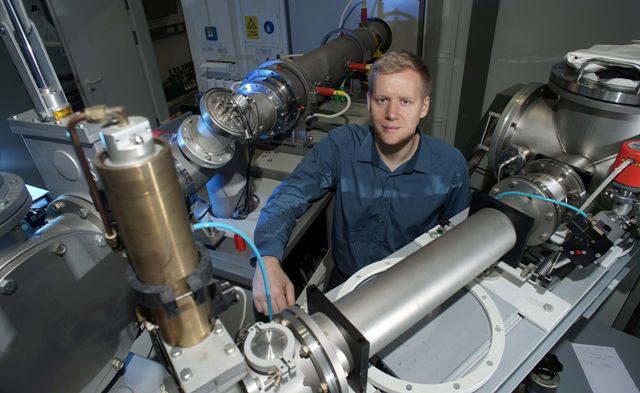Jan 19 2016
Similar to magic tricks seen in the movies, materials possessing properties known as phase transition can change from clear to cloudy when applied to an electric field or according to the temperature. A collaborative team of researchers, including physicists from Germany’s Friedrich Schiller University Jena, have created a method to engineer the transition point at specific temperatures for vanadium dioxide, a phase-transition material.
 The physicist Jura Rensberg is part of the international researcher team. (Photo credit: Jan-Peter Kasper/FSU)
The physicist Jura Rensberg is part of the international researcher team. (Photo credit: Jan-Peter Kasper/FSU)
Their research findings have been published in the Nano Letters journal, and the research has the potential to aid in the development of innovative tunable materials for use in the areas of optics and thermal regulation.
Essentially, any optical component would be better if it were tunable.
Mikhail Kats, Assistant Professor of Electrical and Computer Engineering, University of Wisonsin-Madison
Instead of depending on mechanical components to focus an object - such as a telescope eyepiece or a camera lens - a tunable material is capable of altering its innate optical properties as required. For over 50 years, scientists have known that materials such as vanadium dioxide are capable of transitioning between transparent and opaque, though the transition can only be achieved under a specific set of conditions, restricting their applicability.
In most phase-transition materials, the change occurs at conditions that are far from room temperature, and thus are difficult to incorporate into useful devices.
Mikhail Kats, Assistant Professor of Electrical and Computer Engineering, University of Wisonsin-Madison
The researchers were able to move the intrinsic shift point of vanadium dioxide from 68°C to below room temperature. They also effectively managed to tune the material’s transition to any temperature.
This finding is going to open new frontiers in photonic devices.
Shriram Ramanathan, Professor of Materials Engineering, Purdue University
As the physical and optical properties occur from the same fundamental physical principles, the electrical and thermal conductivities of vanadium dioxide also change with the transition. The materials, that respond to the environment, have the potential in application for windows or "smart" walls in homes.
Objects designed to emit light efficiently at high temperatures but not at low temperatures could be used as purely passive temperature regulators that do not require external circuitry or power sources.
Mikhail Kats, Assistant Professor of Electrical and Computer Engineering, University of Wisonsin-Madison
During previous attempts to alter vanadium dioxide’s transition temperatures, researchers always introduced impurities. The method used changed the entire surface of the material, therefore the German-American research team used energetic ions to bombard only certain areas of the vanadium dioxide.
Ion irradiation tends to create an unplanned side effect which causes defects in materials. But according to Carsten Ronning of the Friedrich Schiller University Jena, these defects are now being used by the researchers to their advantage.
The beauty in our approach is that we take advantage of the 'unwanted' defects. We can precisely control the transition temperature everywhere on the sample, with roughly 20-nm precision. We have been able to use this method to create highly effective meta-surface areas which have multiple phase transitions at the same time.
Carsten Ronning, Friedrich Schiller University Jena
The researchers were able to use this method to design and develop a new optical polariser, which could alter selectivity as per the temperature.
The research was assisted by many scientists from across the globe. The paper’s co-first authors, Jura Rensberg of the Friedrich Schiller University Jena and Shuyan Zhang of Harvard University, are undertaking PhDs in the laboratories of Professor Carsten Ronning and Professor Federico Capasso, respectively.